Naomi Frederick on Comparisons to Margaret Thatcher & the Importance of Boots in London's Hobson's Choice

(Photo: Nobby Clark)
The 1916 Harold Brighouse play Hobson's Choice is an English theatrical warhorse, and its latest London run at the Vaudeville Theatre comes anchored by a commanding star turn from Naomi Frederick. An alum of Shakespeare's Globe and the touring company Kneehigh, Frederick plays Maggie, the starchiest and also most enterprising of three daughters of the heavy-drinking scold of a father, Henry Hobson (played by 1996 Tony nominee Martin Shaw). A feisty businesswoman who insists on love and gets it, Maggie is a plum of a role, and Frederick was eager to talk about its rewards between performances on a recent two-show day.
How does it feel to be in London after touring with the production?
I feel as if I'm in Maggie's boots now, well and truly. I did find it quite hard gripping on to her when we were in rehearsal because she is very particular and she has a certain mindset, which is that she's the boss. So I couldn't quite pick her up and drop her again; I had to cling on to her throughout. But now that we've performed over 100 shows, I find it much easier to pick her up and pop her down.
Is your character’s firmness tough on those around you?
I think I probably was horrible to live with, or at least my husband [the director Toby Frow] and children definitely noticed. I just couldn't get out of the habit of telling people what to do, but that was because I was just practicing—I think! I mean, I'm not particularly Maggie in myself: I'm not northern and working-class for a start, and I'm easier-going. But I am practical and I am organized—it's just that I am a little softer.
You’re also a mother in real life whereas Maggie is largely defined as a daughter.
Yes, I'm a mother in my own life whereas Maggie is the daughter who exists very much without a mother around because her mother is dead. Maggie is a daughter who becomes a wife who hasn't yet had children whereas my kids are five and nine. But the really big lie I have to say onstage every night is that I'm 30. I deliver that with a great grin inside.
The audience certainly reacts when Maggie is dismissed early on as an unlovable spinster.
I know, which is so lovely. I love it that they're so supportive.
It seems like you don't play Maggie in order to be liked and yet the audience in every way warms to her by the end.
Actors sometimes have to be brave enough and selfless perhaps to realize that you can't be too vain and want the audience to like you. Maggie isn't especially likable and she certainly doesn't live her life wanting to be liked. But I did work hard to find where Maggie was coming from and to insist on some humor and warmth so that by the end Maggie has learned something quite wonderful, which is that it doesn't always have to be her doing the talking.
What do you think of some commentators comparing this Maggie to Margaret Thatcher?
That didn't occur to me until somebody pointed it out, but I can't say I used that comparison in rehearsals. It's not wrong, but it's also just coincidence that the two women happen to have the same name.
What is striking are the similarities to King Lear, with Henry Hobson this furious, unforgiving father who, also like Lear, happens to have three daughters.
Yes, very much so, with Maggie the oldest daughter here the equivalent of Cordelia, who is the youngest daughter in Lear. The difference is that Cordelia is so much sweeter and Maggie is so much tougher, but I take a lot from Lear's story and the idea of the family unit which is such a precious and strong thing but also so complicated, and that's what keeps the play modern. Families are and always will be, and therefore this is a play for today and not just one from 100 years ago.
Did you know the play beforehand?
Funnily enough, I was in it at drama school [London's RADA] playing a very small part—a woman who comes on in act one and never returns. So when I had the chance to audition for Maggie, I grabbed it because I knew what a good play it was and also knew that I hadn't been able to dive into the play last time but could do so now. Our drama school Maggie was Katherine Kelly, who went into [popular TV soap opera] Coronation Street shortly after leaving RADA.
Has being in a play about a Victorian-era bootmaker had an effect on your footwear?
I actually have a very fussy relationship with my feet in that I have to get the shoes right. I don't know if it was John Gielgud or someone who said of actors that how you feel in your shoes is really important, and it's true. The other night, my boots had gone to the cobbler and really were on their last legs and weren't back in time for the show, so I had to use a stand-in pair of boots which were an inch higher than my normal ones and oh my God it was exhausting for a start. I mean, Maggie's on her feet for most of the play!